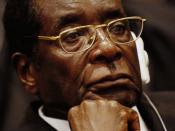Article 1: History of Zimbabwe
In 1834, there were conflicts between the Ndebele and the Rozwi and in the end the Ndebele were victorious after assassinating the Rozwi leader. Meanwhile, European gold seekers and ivory hunters were moving into Shona and Ndebele territory. The best known of these was Cecil John Rhodes who led heavy-handed white settlers in. By 1895, the new country was being referred to as Rhodesia and a white legislature was set up.
Tension between black and white came into sharp focus during the 1920s and 30s through referenda and legislation, which excluded black Africans from ownership of the best farmland. The effect was to forced Africans to work on white farms and in mines and factories for poor wages.
Ian Smith became Rhodesia's president in 1964 and he made a Unilateral Declaration of Independence. The Declaration was declared illegal by Britain, and the UN imposed sanctions in 1968.
The African parties opted for increasingly fierce guerilla warfare (known as the Second Chimurenga) and whites began to abandon their homes and farms. Finally after trying ceasefires, amnesties and secret talks, he was forced to call a general non-racial election and hand over leadership to Abel Muzorewa.
In 1980 the constitution was painfully thrashed out between Smith, Muzorewa, and other high-ranking nationalists such as Joshua Nkomo and Robert Mugabe. In carefully monitored election of March 1980, Mugabe prevailed by a wide margin and Zimbabwe joined the ranks of Africa's independent nations.
Since then Mugabe, a committed Marxist, has hung on to power through thick and thin ever since.
Impatience have been felt throughout Zimbabwe by it's citizens as Mugabe continues to give permission to individual groups of Africans, to do what they believe is necessary, for them to live a better life than what they should actually have.


